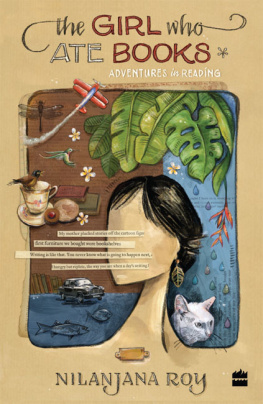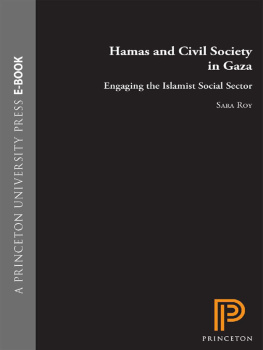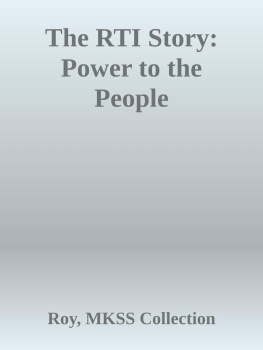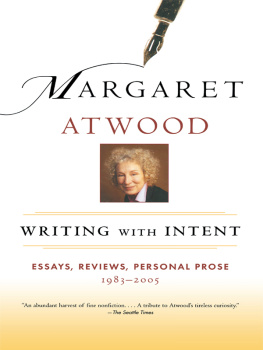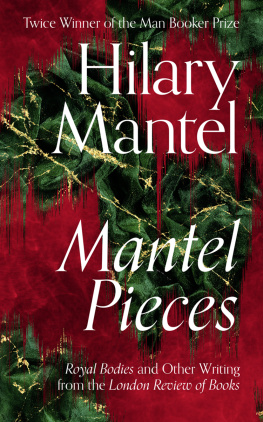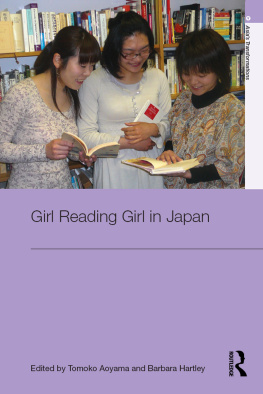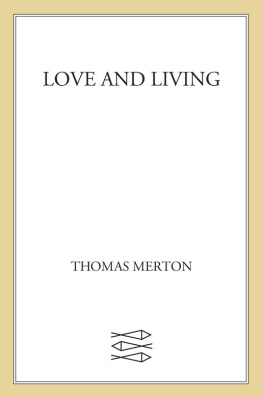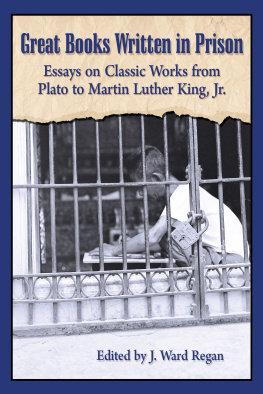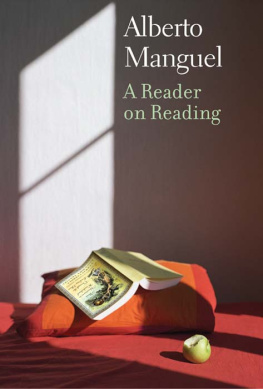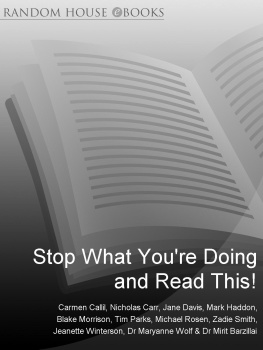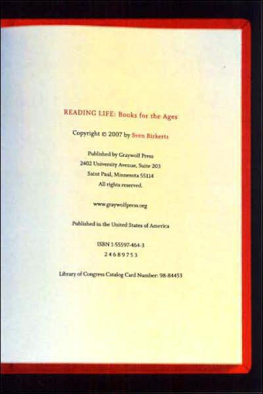THE GIRL WHO
ATE BOOKS
ADVENTURES IN READING
NILANJANA ROY

For those ace storytellers, Ma and Baba,
who never once said, Youre too young to read this.
Contents
Were done, I said.
It had taken almost two weeks of sweatall too literal, in Delhis humidityto clean up our bookshelves, and I was staring at the end result. The Holy Grail of bookshelves, the ultimate shrine, the sanctum sanctorum, the point where every booklover and hoarders pilgrimage ends: an empty shelf. Two of them. A gift from the gods, a sign, allowing us to continue on the manic, ruinous path of collecting books that marks a reader forever, setting him or her apart from the rest of the community as surely as you wearing a silver bell that rings: Hoarder! Hoarder!
Booklove is a dangerous thing. Those of us who have it do not joke about it or take it lightly, because booklove is all-consuming. You move houses with an eye to wall space, and you covet other peoples bookshelves, especially if they had more skilful carpenters than you.
My partner and I both inherited moderately large libraries, and perhaps we had fallen into the trap of thinking of these only as family books. The inheritance had come in a mass, as one solid bookshelf worth of things to be read and dusted and looked after. But as I sorted these books, I suddenly found myself back in touch with people whom I could never have known, because they had died before I was born.
As we pulled them out from the bookshelves, looking at the names inscribed in faded fountain-pen ink on the fly-leaf, I began to see more clearly the individual readers behind the collection.
Here was the doctor from two generations ago who loved history, here was the boy straight out of his village who built a broader world by reading in three languages, here were the reformers whose hopes for a better world were encased in their lectures, and the essays they collected.
My grandmother on one side brought in cookbooks, womens magazines, Mills & Boons, and sometimes, the anguished memoirs of pioneering Bengali women. Her handwritten ledgers reminded me that none of my other grandmothers books had survivedher collections of almanacs, volumes of Bengali literature and even her own short stories had disappeared after her death. I could almost see the gap in the bookshelves, remember the way her presence in our house had allowed us to float comfortably from English to Bengali, demanding and receiving stories in both languages.
Over the years of our marriage, these books had been buried underneath the inevitable layers of more and more books, the objects that haunt professional readers and reviewers. Discovering them made me wonder how we had sorted our shelves in the first place. The present had dislodged much of what was really important and meaningful, and there was a special pleasure in rescuing and re-reading what had been allowed to slip to the back.
The slow accumulation of books in any readers life testifies to many things, but chiefly, to hope. There is nothing more optimistic than a shelf-ful of books you have not yet read, but that you mean to get down to someday. And yet, too much booklove, and what you have is a disease; the books you do not love and would not normally read or keep or treasure, or tell friends about, accumulate thickly, like fungus, like mold, around the books that you truly love and will come back to, again and again.
As we assessed the books, perhaps we seemed ruthless, in the way that we discarded perfectly good writers and anthologies. But as I placed each book on the donations pile, I also sent up a silent prayer for it, hoping that it would find its readers.
Books, like people, like children, should always be certain of a warm welcome, wherever they go next. Few books survive in their physical form beyond 150200 years; in that time, perhaps they should exchange readers a lot, perhaps they should be shared until their beautiful bound leaves start to drop and shed. They deserve to be loved, especially the old ones, that were hand-sewn, hand-bound, made with care.
As we cleaned each of those shelves, I inhaled dust for three weeks, and became sick from the past. We sniffed the pages of encyclopaedias and dictionaries so far beyond the restorers art that they fragmented at the lightest touch, exploding into the air like enchanted objects. But whenever I looked upon the books, mine and my partners, I felt a sense of kinship that went beyond the blood ties of family. The people who had bought and collected these books, our ancestors, were ordinary readers.
The two of us loved books and reading and authors for no good reason except that it had been encoded in our DNA by the previous generations, because we had lived in homes where everyone read books, as a matter of course. My father had grown up in a small town with a tiny library; in later years, he bought books expansively, with the same joy of the forbidden that was reserved for things like expensive, imported chocolates.
When I look more closely at the family books, one thing stands out. You dont collect books to demonstrate how much you know about the world; instead, these small libraries represent every readers acknowledgement of how little you know about the world, and how much you reach out for it anyway.
Collecting books is the same as looking up at the stars: you dont want to own the stars, any more than you want to own books or the knowledge in them. All you hope to do is to brush the surface of wonder, to acknowledge that there is still, as an adult, some part of you that is always in awe of, and in love with, the world and the word.
*
This book is chiefly about the love of reading, and about a reading childhood in India. It is not intended to be a history of Indian writing in English (though youll find some excellent histories of Indian writing and publishing in the Bibliography) or a history of contemporary Indian writers. Instead, these essays track one readers journeysometimes awkward, often magicalinto becoming a writer. Most of these essays were written for the general reader; my apologies in advance to those academics and scholars who are already familiar with Dean Mahomet and the rest of the gang of Indians who wrote in English in the eighteenth and nineteenth centuries and who will not find much here that is revelatory. Because I love reading in Bengali and grew up in Delhi and Kolkata, these essays centre on English, Bengali and those two cities; I can only hope that readers incensed by this evidence of gross bias will redress the balance by writing their own memoirs of reading in other parts of India.
Some pieces originally intended for this edition were omitted, on reflection: three long essays on reading Indian writers in translation, on memoirs and writings about caste in India, and on cookbooks and on food writing seemed incomplete, and besides I wasnt sure I was in any way qualified to speak on Dalit writers. Book reviews were left out for the most part because I prefer writing them to re-reading them. An ambitious essay on a subject close to my heart, the libraries and reading habits of prominent Indians in the national movement, has been set aside until I can find time to read the little magazines and journals of those decades.
The first two essays, The Girl Who Ate Books and Finding Dean, are about reading, and the slow, tentative shift towards becoming a writer and finding my family: a bunch of excitable, eccentric and voluble Indians from the eighteenth and nineteenth century. How To Read In Indian collects assorted profiles on the pioneers of Indian writing in English, from enterprising eighteenth-century spa proprietors armed with pamphlets and chutzpah, to the early twentieth-century woman who set up schools for Muslim girls and imagined a classic feminist Utopia. From the novels written after and about 1857 to a glimpse of the language debates over Indian English to a previous generations obsession with the Encyclopaedia Britannica, this section touches very lightly on the history of Indian writing in English across three centuries.
Next page
